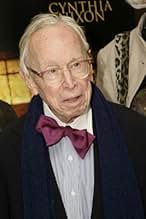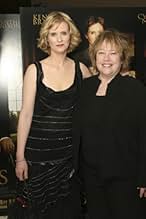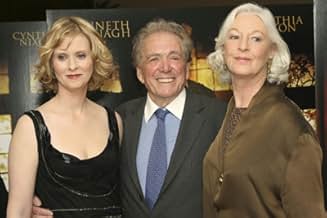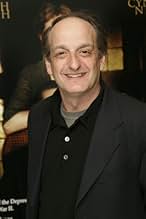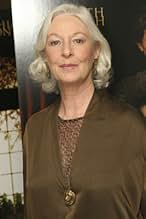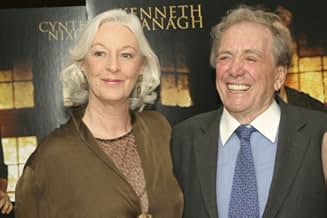CALIFICACIÓN DE IMDb
7.4/10
3.5 k
TU CALIFICACIÓN
Agrega una trama en tu idiomaThe stirring true story of Franklin D. Roosevelt's battle with polio in 1921.The stirring true story of Franklin D. Roosevelt's battle with polio in 1921.The stirring true story of Franklin D. Roosevelt's battle with polio in 1921.
- Ganó 5 premios Primetime Emmy
- 12 premios ganados y 42 nominaciones en total
Matt O'Leary
- Fred Botts
- (as Matthew O'Leary)
Andy Davoli
- Jake Perini
- (as Andrew Davoli)
Brian F. Durkin
- Elliott Roosevelt
- (as Brian Durkin)
- Dirección
- Guionista
- Todo el elenco y el equipo
- Producción, taquilla y más en IMDbPro
Opiniones destacadas
Having been a a patient at Warm Springs for many years during the 1930s and late 1940s, I feel qualified to critique the HBO movie, Warm Springs. The feel of the period and the scenes of the Warm Springs area were fairly realistic. The Meriwether Inn and the surrounding grounds were located on top of a hill, and not on flat ground. The pool where everyone swam was the authentic pool that FDR asked his friend Edsel Ford to build for him, after he acquired the property. I have swum in the pool many times. FDR was a man of great humor, and this is what is lacking in Kenneth Branagh's portrayal. Branagh completely missed the essence of the man, but so would any actor who attempted to portray FDR. Fred Botts was a great friend of mine, and when he arrived in Warm Springs, it was in the baggage car of the train. His brother accompanied him, and had modified a packing crate for him to rest in. He couldn't sit up for very long without experiencing great discomfort. He could stand up, or he could lie down, so he asked his brother to build him the crate so he could ride in comfort from Pittsburgh to Warm Springs. FDR's first words to him upon Fred's arrival were, "You must be the skeleton from Pennsylvania." Fred was tall and very thin. In 1916, Fred was working toward his debut with the Metropolitan Opera in New York City. Among his admirers and supporters was Enrico Caruso. When polio struck him, his singing career ended, and he returned home to Pennsylvania, where he remained a prisoner in his family home for 10 years. When he arrived at Warm Springs, he and FDR immediately became great friends, and he remained as the registrar of the hospital until his death in the 1950s. He was FDR's favorite singer, and he used his great bass voice to lead the Companions (the term for the first patients of Dr. Roosevelt) in singing at the many picnics that FDR had up on Pine Mountain. He was not the callow youth portrayed in the movie. Tom Loyless was, in fact, the co-owner of the Columbus, GA Ledger, and not a failed newspaperman as portrayed in the movie. Doctor Lovett was the first doctor at the hospital, and he did much good work among the patients. The report he supposedly wrote about FDR's condition is a fiction, as far as I know. The trip to the medical convention in Atlanta was mostly Hollywood propaganda. The pushboys were FDR's invention, and not Helena Mahoney's. FDR's appearance at the Democratic Convention in Houston happened much the way it was portrayed in the movie. Overall, the movie portrayed FDR's family situation fairly accurately. He experienced great pressure from his mother to come to Hyde Park and hide in the family home. It is to his great credit that he did not do this. A final note, it's a pity that FDR's law partner in New York, Basil O'Conner, was left out of the film. FDR persuaded O'Conner to become the Chairman of the National Foundation for Infantile Paralysis. It wasn't long until the March of Dimes became the major funding effort for the National foundation, and Warm Springs was on solid financial ground. Comedian Eddie Cantor came up with the March of Dimes idea.
This is a very good film on the evolution of FDR from having a rather detached philosophy of noblesse oblige to having the cause of the downtrodden brought up close and personal when he becomes crippled from polio at the age of 39.
The acting and production values are superb, but the film tries to paint over a few things in order to make FDR's evolution look more perfect than it was. The truth is FDR and his wife Eleanor never truly reconciled after his illness as is shown in the film. It did not bring them close together. The only reason they did not divorce was the insistence of Roosevelt's mother, and then as FDR got more involved in politics, appearance was involved in them staying together. FDR and Lucy Mercer, the woman he wanted to divorce Eleanor for, carried on a relationship of sorts from 1915 until Roosevelt died in 1945. Lucy Mercer was with him when he died at Warm Springs. I say this not as a character assassination of a truly great leader long dead, but to point out that a person can be far less than perfect personally and still be that truly great leader. This film's makers seem to think the viewer is not smart enough to deal with that.
There is one bit more of oversimplification that made me roll my eyes. After FDR gets involved in the running of Warm Springs, some patients from the Northeast arrive. One of them, with an obvious New York accent, shakes the hands of one of the black caretakers. The black caretaker looks shocked to be treated as an equal by a white man. The insinuation here is that racial prejudice did not exist in the Northeastern U.S. which is poppycock. Some of the most racially prejudiced people you'll meet are from the Northern U.S. See some episodes of "All in the Family" to see the awful truth.
Now in only two paragraphs I can tell you everything I don't like about this film and I just did that. If not for these two white-washings I'd give it ten stars and I still highly recommend you watch it if you get the chance. Cynthia Nixon really makes you believe she is Eleanor Roosevelt, and Kenneth Branagh is superb as FDR, a man who has to come to terms with his new limitations and yet sees how lucky he was to have at least 39 years of good health and the financial resources to deal with his own health and maybe help some other people too. There's always someone worse off than you are, and maybe you can lend them a helping hand is the inspirational message of this film to me. Highly recommended.
The acting and production values are superb, but the film tries to paint over a few things in order to make FDR's evolution look more perfect than it was. The truth is FDR and his wife Eleanor never truly reconciled after his illness as is shown in the film. It did not bring them close together. The only reason they did not divorce was the insistence of Roosevelt's mother, and then as FDR got more involved in politics, appearance was involved in them staying together. FDR and Lucy Mercer, the woman he wanted to divorce Eleanor for, carried on a relationship of sorts from 1915 until Roosevelt died in 1945. Lucy Mercer was with him when he died at Warm Springs. I say this not as a character assassination of a truly great leader long dead, but to point out that a person can be far less than perfect personally and still be that truly great leader. This film's makers seem to think the viewer is not smart enough to deal with that.
There is one bit more of oversimplification that made me roll my eyes. After FDR gets involved in the running of Warm Springs, some patients from the Northeast arrive. One of them, with an obvious New York accent, shakes the hands of one of the black caretakers. The black caretaker looks shocked to be treated as an equal by a white man. The insinuation here is that racial prejudice did not exist in the Northeastern U.S. which is poppycock. Some of the most racially prejudiced people you'll meet are from the Northern U.S. See some episodes of "All in the Family" to see the awful truth.
Now in only two paragraphs I can tell you everything I don't like about this film and I just did that. If not for these two white-washings I'd give it ten stars and I still highly recommend you watch it if you get the chance. Cynthia Nixon really makes you believe she is Eleanor Roosevelt, and Kenneth Branagh is superb as FDR, a man who has to come to terms with his new limitations and yet sees how lucky he was to have at least 39 years of good health and the financial resources to deal with his own health and maybe help some other people too. There's always someone worse off than you are, and maybe you can lend them a helping hand is the inspirational message of this film to me. Highly recommended.
My wife is a polio survivor, and obviously handicapped, from the disease's last American days in the 1950's. I was a little worried about selecting it for our evening viewing because too often movies about a physical or other handicap tend to fall into a mushy wallow of pity and become insulting. Whatever failings this one has as an historical or biographical document, so ably pointed out by my fellow reviewers, it was clear to us that the real topic was his facing, accepting, and surviving polio and then moving on. It did so realistically and with complete grace. The portrayals of paternalism/pity/revulsion shown the handicapped by many and by Franklin himself were spot-on examples of the well-meaning but hurtful attentions that people carrying many different burdens get handed daily. The polio didn't ultimately define FDR-the man, any more than his hair color did but the movie does a wonderful job showing his transition to that realization, and yet never asks us to feel sorry for him.
8=G=
"Warm Springs" is a tour de force by Branagh who portrays FDR as a man of money and privilege who is struck down by polio in the early days of his political career. Unable to use his legs he begins to wallow in self pity until he visits a Georgia mineral water spa called Warm Springs where he finds honesty, compassion, kinship, and most of all himself, his wife, and a new sense of purpose. A very pretty period film with good production value, an excellent supporting cast, and sterling performances by Branagh and Nixon, "Warm Springs" would have made an enjoyable stand alone drama. The fact that it's also a biopic about FDR only serves to make it that much more interesting. Another winner for the whole family from HBO. (B+)
In this splendid new HBO film about Franklin Delano Roosevelt, his wife Eleanor says to him, "You have done a brilliant thing here, a magnificent thing." She's speaking of his work at Warm Springs, the polio rehabilitation center in Georgia, but the same can be said for Kenneth Branagh's charismatic portrayal of America's almost legendary president, who was elected four times and died in office in 1945. So many fine comments have been made about the film that I won't go over the same ground. It has obviously been created with love and care -- the production values are top notch, the screenplay and direction are strong. The casting could not been better -- there's not a weak performance in it, down to the smallest role. Mr. Branagh leads a superb company which includes Cynthia Nixon, David Paymer, Kathy Bates, Jane Alexander -- I add a special word for Tim Blake Nelson who gives a heartbreaking performance as the manager of Warm Springs. I can't imagine anyone who would fail to enjoy this film. Bravo, HBO!
¿Sabías que…?
- TriviaMost of the actors and actresses playing disabled people in this movie are actually disabled, including "I Won't Dance" cast member Teal Sherer.
- ErroresIn the opening scene, newsreel from the Democrat National Convention of 1920 shows FDR talking and people cheering as part of the film. Film with sound wasn't invented until 1927, and even then was quite rare until 1930 or 1931.
- Citas
Franklin Delano Roosevelt: [on first arriving at Warm Springs] This place should be condemned!
Tom Loyless: We have seen better times. But then, I imagine, so have you.
- ConexionesFeatured in Warm Springs: Making of Featurette (2005)
- Bandas sonorasI'll See You In My Dreams
Written by Isham Jones and Gus Kahn
Performed by Alice Faye
Courtesy of Twentieth Century Fox Film Corporation
Selecciones populares
Inicia sesión para calificar y agrega a la lista de videos para obtener recomendaciones personalizadas
Detalles
- Fecha de lanzamiento
- País de origen
- Sitios oficiales
- Idiomas
- También se conoce como
- Warm Springs
- Locaciones de filmación
- Summerville, Georgia, Estados Unidos(train depot)
- Productoras
- Ver más créditos de la compañía en IMDbPro
Taquilla
- Presupuesto
- USD 13,000,000 (estimado)
- Tiempo de ejecución2 horas 1 minuto
- Color
- Relación de aspecto
- 1.78 : 1
Contribuir a esta página
Sugiere una edición o agrega el contenido que falta

Principales brechas de datos
What is the French language plot outline for manantiales cálidos (2005)?
Responda

